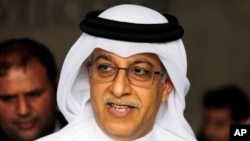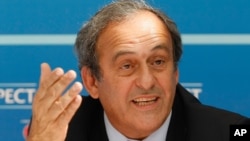A Bahraini sheikh is going for simplicity and fan-appeal with headline pledges to transform a discredited FIFA: Relinquish much of the power Sepp Blatter built up over 17 years at FIFA and take no salary.
Sheikh Salman bin Ibrahim Al Khalifa was a late, seemingly reluctant candidate to lead FIFA's recovery from a corruption crisis that is likely to see fresh revelations of wrongdoing emerging long after election day in February.
“I don't want too much power with the president - the power has to be shared,” Sheikh Salman said in an interview with The Associated Press. “I believe in doing things in a different way, not being centralized where the president has to do every detail in running the business.”
That means taking no money for being the face of FIFA.
“I don't want to be an executive president,” the sheikh said. “And if I'm not an executive president I don't see how I do deserve to be paid.”
Rather than a bitter election fight until February 26, the sheikh hopes there is a smooth succession, with the five candidates currently vying to run football whittled down before election day.
“I'd like to see most of the continents agreeing on a single candidate but we have to work for this in the next few weeks,” the sheikh said during an hour-long interview in the Bahraini capital Manama.
Had it not been for Michel Platini injudiciously claiming 2 million Swiss francs ($2 million) from FIFA four years ago, this Manchester United-supporting member of Bahrain's royal family would not now be a front-runner to become the first Arab leader of FIFA.
Having been among Platini's early campaign champions, Sheikh Salman entered the race once it became clear the UEFA president's suspension over that 2011 payment made the election outcome far more uncertain. The Asian Football Confederation president would not have wanted Prince Ali bin al-Hussein of Jordan to have a clear path to the presidency.
The decision to stand was effectively a toss-up between Sheikh Salman and fellow FIFA executive committee member Sheikh Ahmad Al-Fahad Al-Sabah, the Kuwaiti who built his powerbase through the Olympic movement.
“We felt after Michel's ban we felt one of us has to go,” Sheikh Salman said. “And I think that he looks at it as (a job for) the president of a confederation... it wasn't a difficult choice between us.”
Platini is out of contention while awaiting the full verdict from FIFA's ethics judge which could result in a long ban for the former France captain.
“I think damage has been done,” Sheikh Salman said. “But he has the right as well to defend himself. We cannot judge.”
The sheikh has already faced the judgment of many. With little name recognition profile among football fans outside the Asian region he has led for barely two years, his international spotlight usually comes when challenged on human rights abuse allegations he denounced as lies.
Despite complaints against his candidacy from rights groups, the sheikh was last week approved as a candidate by FIFA's election watchdog alongside four other men: Prince Ali, UEFA General Secretary Gianni Infantino, former FIFA official Jerome Champagne and apartheid-era former Robben Island prisoner Tokyo Sexwale.
Platini still wildcard
How many names are on the ballot paper in Zurich in February could depend on whether Platini defies expectations and is cleared before election day.
“If he comes back and he still wants to run, I think we would have to sit together... and assess the situation,” Sheikh Salman said. “I am sure there will be an agreement. At the end of the day we all need to support each other... (and) come with a compromise to hopefully have a good solution for everybody.”
Whether that agreement could include the 49-year-old sheikh quitting the campaign is unclear.
“Anything is a possibility if it's for the good of the cause,” he said. “But I didn't go in and commit myself to give a full presumption I might withdraw. I'm in to go for the election.”
The sheikh had expected to gain Europe's support until UEFA surprisingly endorsed Infantino on candidate deadline-day last month. Infantino, who will stand aside for Platini if his boss his cleared before election day, has been touted for a potential role running the FIFA administration under a Sheikh Salman presidency.
“I'd like to feel like we are working together, not against each other - working for one cause to make that change,” the sheikh said. “We have to sit and talk and come to a solution of what's best.”
A Salman presidency would look very different from Blatter's reign, potentially blander in terms of public statements. Expect fewer rash pronouncements on changes to the game and awkward asides in speeches.
The sheikh is yet to produce his manifesto, but said he would consult the confederations before emulating Infantino and pledging to expand the World Cup by eight teams to 40. Discussing whether the use of technology should be expanded beyond ruling on disputed goals, the sheikh said: “The simple it is the better it is.”
If elected until 2019, the sheikh would have to grapple with the impact of Russia hosting the 2018 World Cup. Beyond ongoing geo-political concerns, Moscow has faced renewed accusations about the probity of its bid since Blatter suggested there was a backroom deal to award the showpiece to Russia for the first time.
“With any vote regarding a World Cup probably the ExCo will talk to say `Yes - how do you feel this and that?’” said the sheikh, who was not on the executive committee at the time of the 2010 vote. “Definitely it's not rigged. You share your views... that doesn't mean you already made an agreement.''
The agreements that will be a priority for the next FIFA president are with sponsors. Only seven of 14 available positions in FIFA's top two commercial categories have been filled, with Dubai-based airline Emirates and Sony among those sponsors yet to be replaced.
“Once people see there is stability and there is a will to do things in the right way I think they will come back,” the sheik said.
“There is no place for, you know, hiding issues away from the public or away from our members.”







